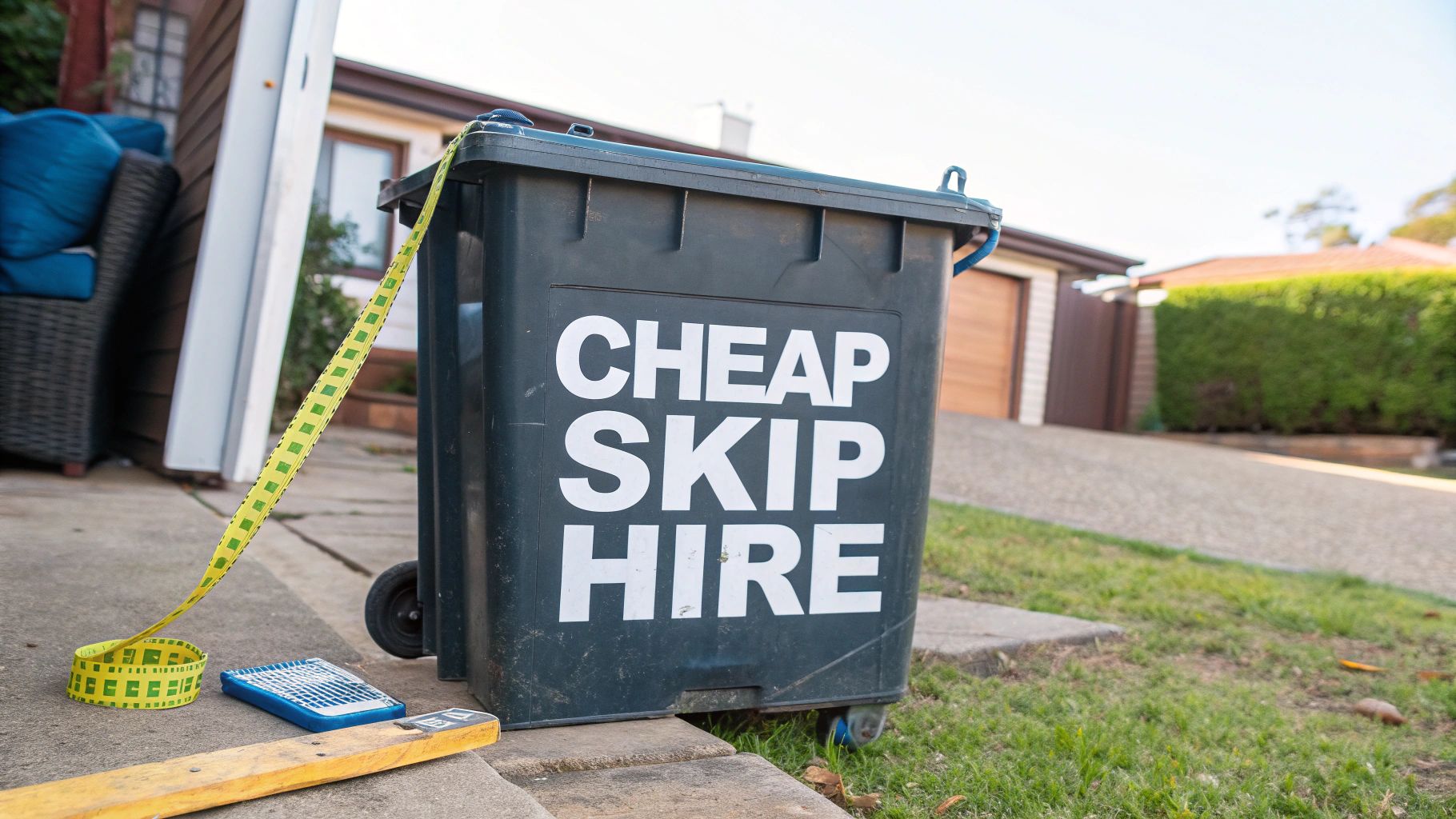Skip Hire Dorchester: Your Easy Waste Removal Guide
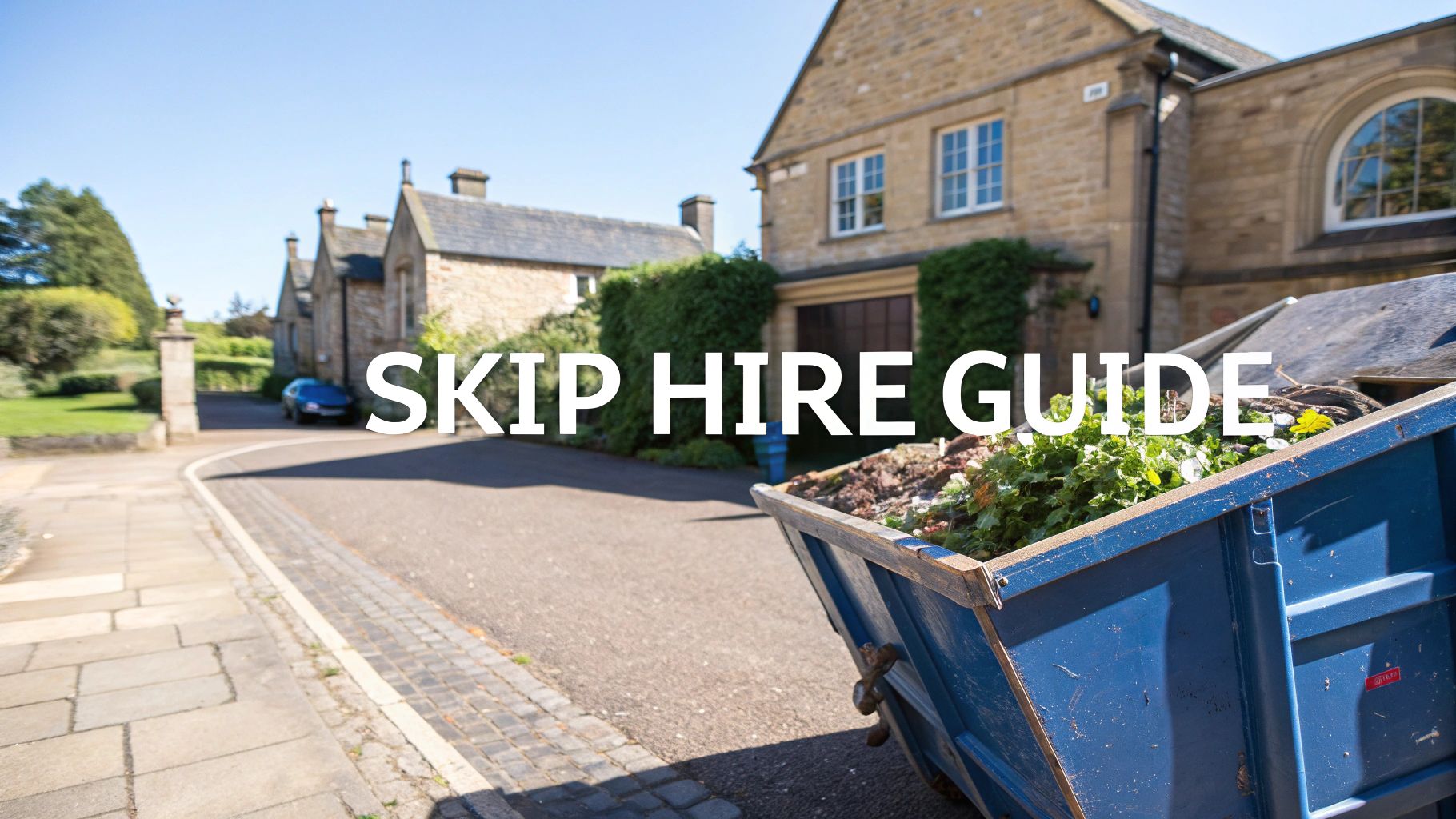
Skip Hire Dorchester: Your Easy Waste Removal Guide
Right then, planning a project in Dorchester? Before you get stuck into the exciting stuff, there’s the less glamorous, but absolutely essential, task of sorting out the rubbish. Getting your waste removal sorted from the get-go is a game-changer, and a reliable skip hire in Dorchester makes the whole process a breeze.
Choosing the right skip isn’t just about saving a bit of time and money – it’s about making sure everything is handled properly and legally, right from your driveway to the recycling centre.
Your Guide to Dorchester Skip Hire
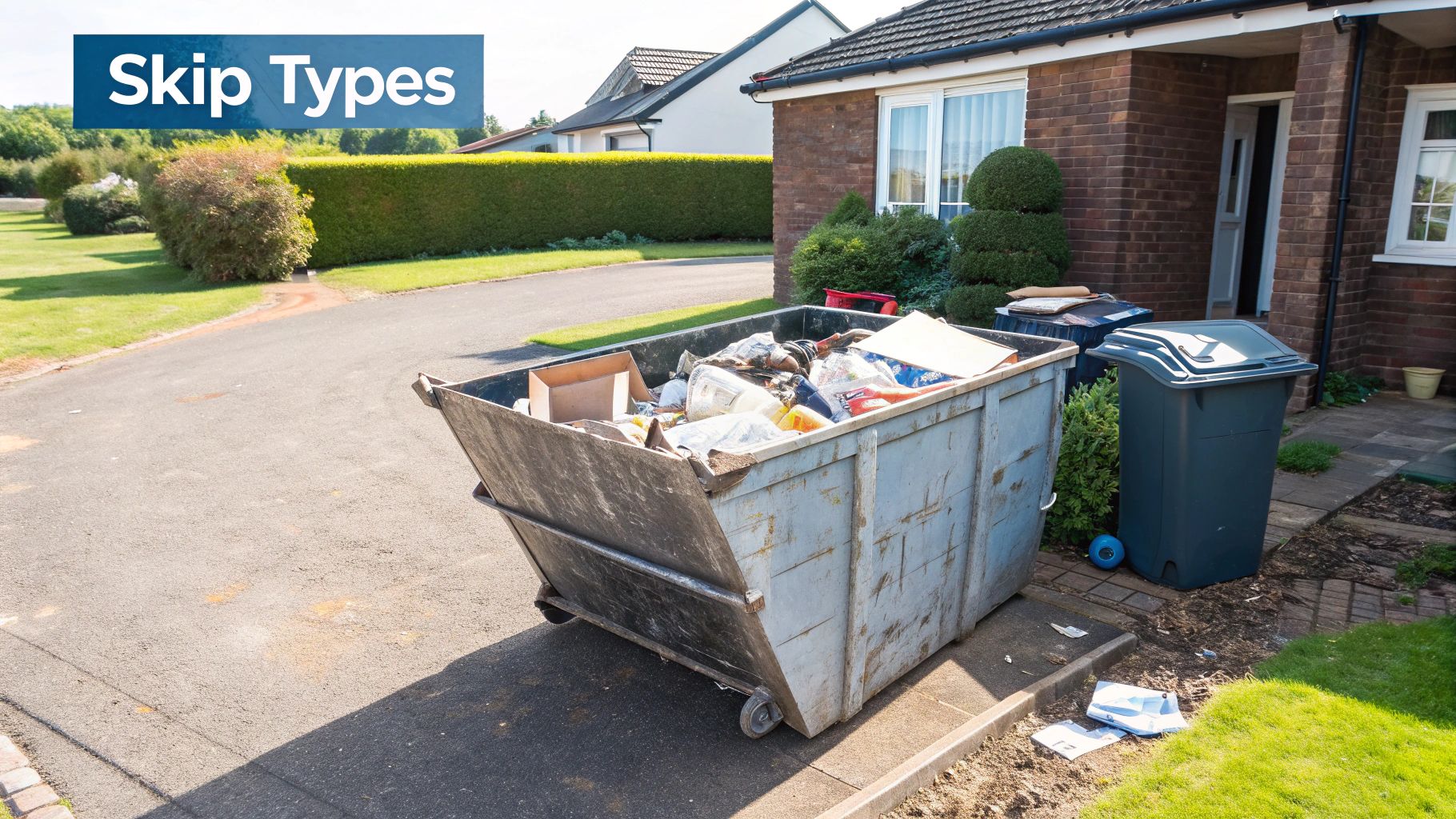
Let’s be honest, good waste management is the unsung hero of any successful project. Whether you’re finally clearing out that jungle of a garden, a builder knee-deep in a renovation, or a local business needing a dependable waste solution, knowing the ins and outs of hiring a skip is key.
This guide is designed to be your straightforward, no-nonsense starting point. We’re cutting through the jargon to focus on what you actually need to know to get the job done right. Our goal is simple: to give you the confidence to book the perfect skip for your job, big or small.
What This Guide Covers
Think of this as your roadmap to hassle-free skip hire. We’ll walk through all the crucial bits to make sure you make a smart choice.
- Sizing It Up: We’ll show you how to properly estimate the amount of waste you’ll have. Getting this right means you pick the most cost-effective skip and avoid the pain of having to hire a second one.
- Permits and Placement: Not sure if you need a permit from Dorset Council? We’ll clear that up. We’ll also cover how to prep your property for a smooth, trouble-free delivery.
- Costs Explained: You’ll get a clear breakdown of what actually goes into the price, from how long you need the skip to the type of waste you’re chucking out.
- Waste Rules: It’s vital to know what you can and can’t put in your skip. We’ll cover the rules to help you avoid rejected loads or unexpected fines.
By the time you’ve finished reading, you won’t just know how to hire a skip; you’ll understand how to manage your project’s waste like a pro. That knowledge is what keeps your Dorchester project on track and on budget.
This guide is your personal checklist for stress-free waste removal. From a small DIY job to a full-scale construction project, the principles are the same: plan ahead, choose wisely, and work with a trusted local team like The Waste Group. Let’s dive in.
Choosing the Perfect Skip Size for Your Project
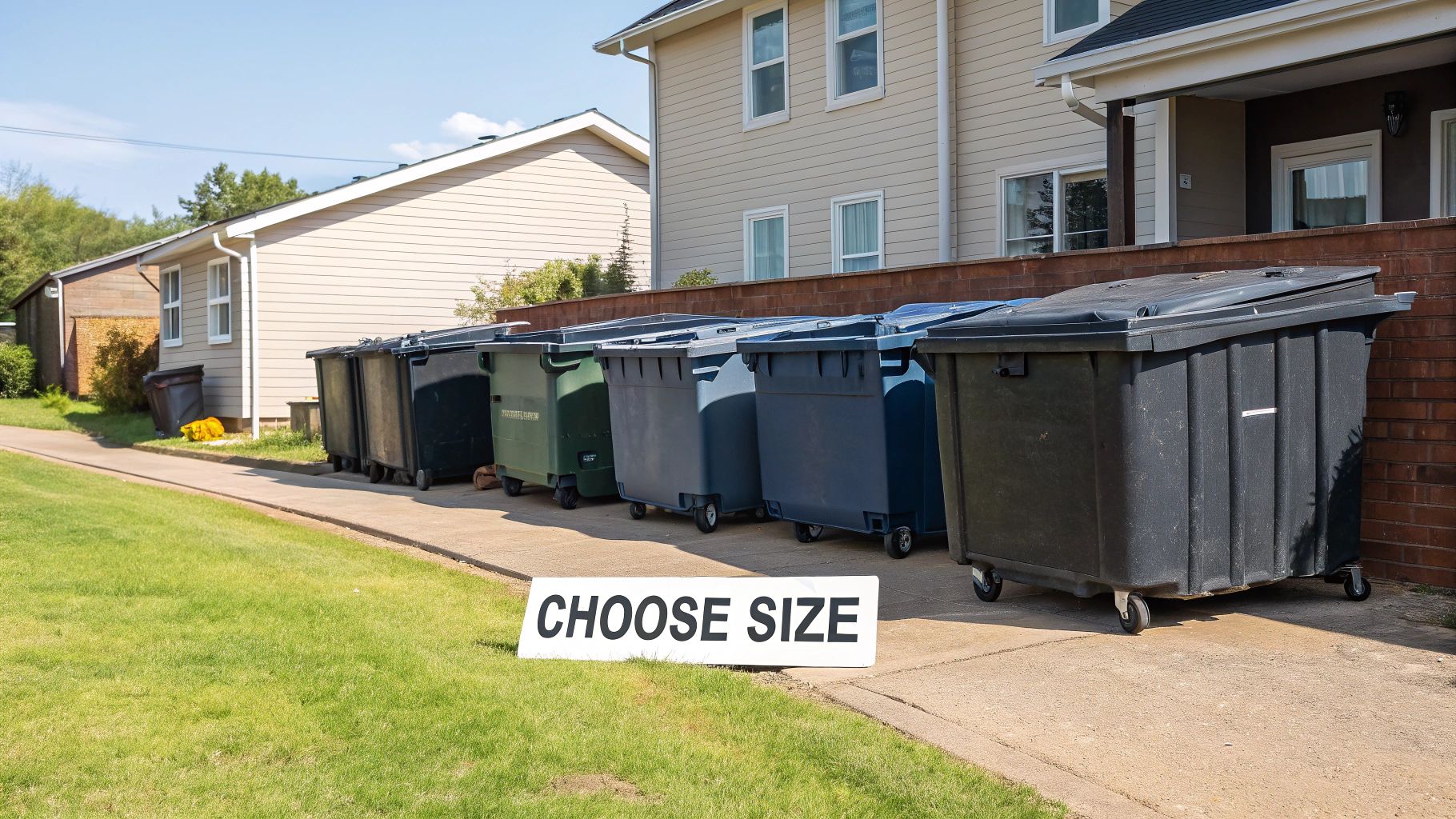
Picking the right skip size can feel like a bit of a guessing game, but getting it right is the secret to keeping your project on track and on budget. If you go too small, you’re stuck with the hassle and extra cost of hiring a second one. Go too big, and you’re literally paying for empty space. When you’re looking at skip hire in Dorchester, a little forward planning goes a very long way.
The best place to start is by picturing the actual pile of waste you’ll be creating. Don’t just pluck a number out of thin air; think about the specific items you’re getting rid of. For a small garden clear-out or decluttering a single room, our mini 4-yard skip is usually the perfect fit. It comfortably holds around 30-40 standard bin bags and is compact enough for most driveways.
Sizing Up for Bigger Jobs
When your project gets bigger, so does your waste. A full kitchen or bathroom renovation, for example, generates a surprising amount of rubble, old units, and packaging. This is where an 8-yard skip—often called a ‘builder’s skip’—really shines. It’s our most popular size for good reason, offering plenty of room for bulky waste from major home improvements or a complete house clearance.
It’s a simple rule of thumb we share with our customers: if you’re hesitating between two sizes, it’s nearly always smarter to go for the larger one. That small extra upfront cost can save you a lot more money and stress in the long run.
A Practical Comparison
To make it easier, let’s break down the common options you’ll find for skip hire in Dorchester. Each size is designed for a different kind of job, from a weekend tidy-up to major construction work.
- 4-Yard Skip: Spot on for garden tidy-ups, small DIY jobs, or clearing out a single room. Think of it as the go-to for a weekend project.
- 6-Yard Skip: A really versatile choice for slightly bigger tasks like a kitchen refit or clearing out a small extension. It gives you that extra capacity without being massive.
- 8-Yard Skip: The real workhorse. This is ideal for major home renovations, significant garden landscaping, and bulky waste from house clearances.
We often see people underestimate the volume of ‘fluffy’ waste, like old furniture or garden cuttings. Once it’s all broken down it takes up less space, but you need to account for its initial bulk when you’re choosing your skip.
If you’re still not quite sure, our detailed guide on what size skip you need has even more real-world examples to help you make the right call. The goal is to find that sweet spot where you have just enough room for all your rubbish without paying for unused space.
Navigating Skip Hire Costs and Permits
Getting a clear picture of the costs involved with skip hire in Dorchester is the first step to keeping your project on budget. The final price tag isn’t just a number plucked from thin air; it’s shaped by a few key things that are good to know before you book.
The most obvious factor is the skip size you go for, but the length of the hire and the type of waste you’re getting rid of also play a big part in the final quote.
For example, a skip packed with general mixed waste from a house clearance will usually be priced differently to one filled with just ‘inert’ waste like soil and rubble. Why? Because inert waste is much simpler and cheaper for us to recycle, and we can pass those savings on to you.
Do I Need a Permit?
This is one of the most common questions we get, and the rule is pretty straightforward. If the skip can sit entirely on your own private land, like a driveway or in the garden, then you do not need a permit. Simple.
However, if even a small part of the skip needs to be on public land – think the pavement or the road right outside your house – then you will legally need a permit from Dorset Council.
Don’t worry about the paperwork, though. We can handle the entire permit application for you, saving you a job. Just let us know you’ll need one when you book, and we’ll get it all sorted.
A quick heads-up: it’s really important to factor in the time it takes for a permit to be approved. Dorset Council can take several working days to process an application, so planning ahead is the best way to avoid any delays to your project.
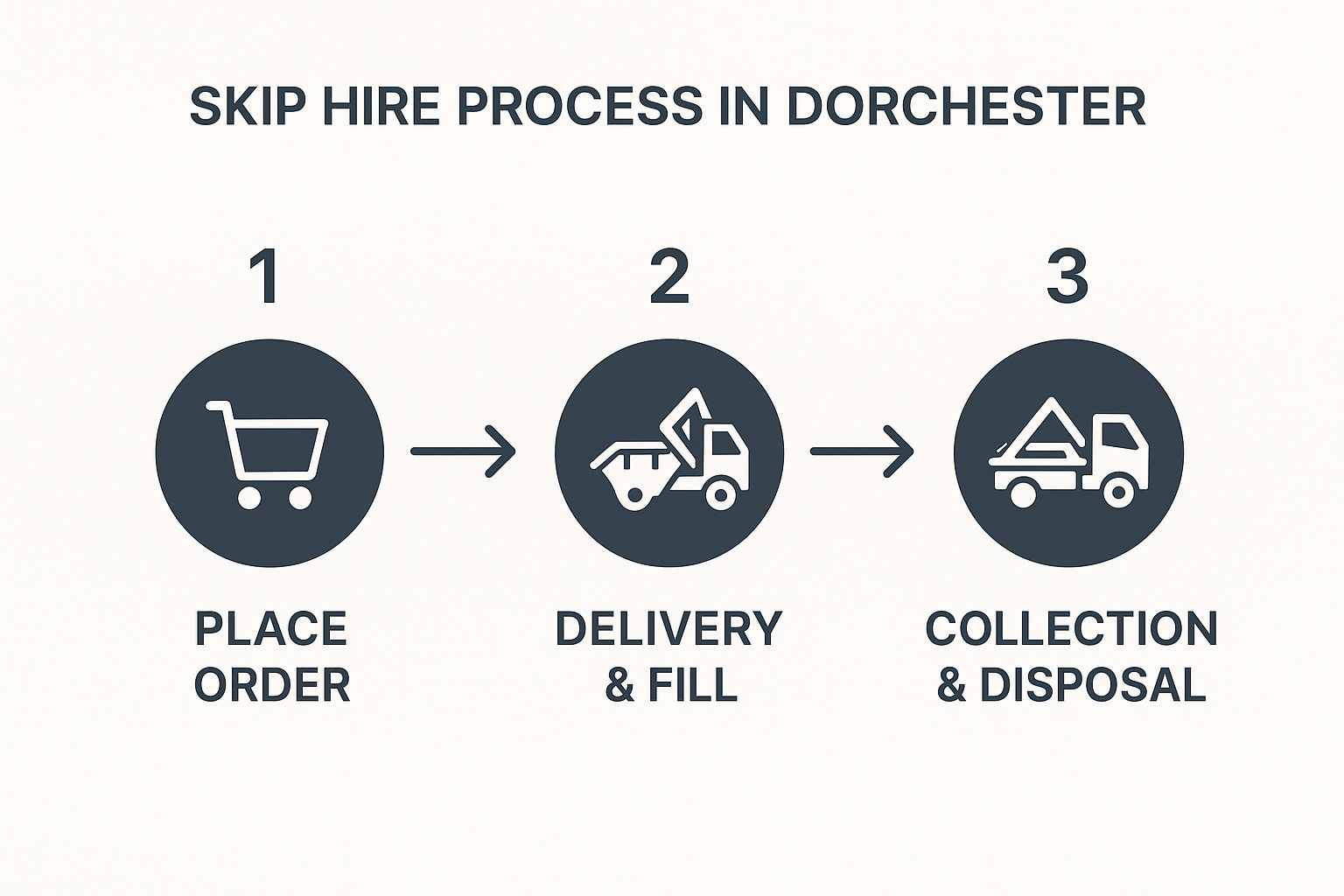
The Hidden Cost: Landfill Tax
A big, and often overlooked, factor that influences skip hire prices is the UK Landfill Tax. This government charge is designed to make sending waste to landfill more expensive, pushing everyone towards recycling more.
The industry has definitely felt the impact of these environmental rules. The standard landfill tax rate is set to climb to a hefty £126.15 per tonne in April 2025. To put that in perspective, that’s a massive jump of nearly 38% from the £91.35 rate back in 2019.
This rising operational cost is a key reason why choosing a company like ours, one that is serious about high recycling rates, can often mean better value for you.
When it comes to pricing, we believe in being completely upfront. For a full breakdown tailored to your job, take a look at our guide on skip hire prices in Dorset. It’ll give you a clear picture of all the potential costs, helping you budget properly for your project in Dorchester with no nasty surprises.
What You Can and Cannot Put in a Skip
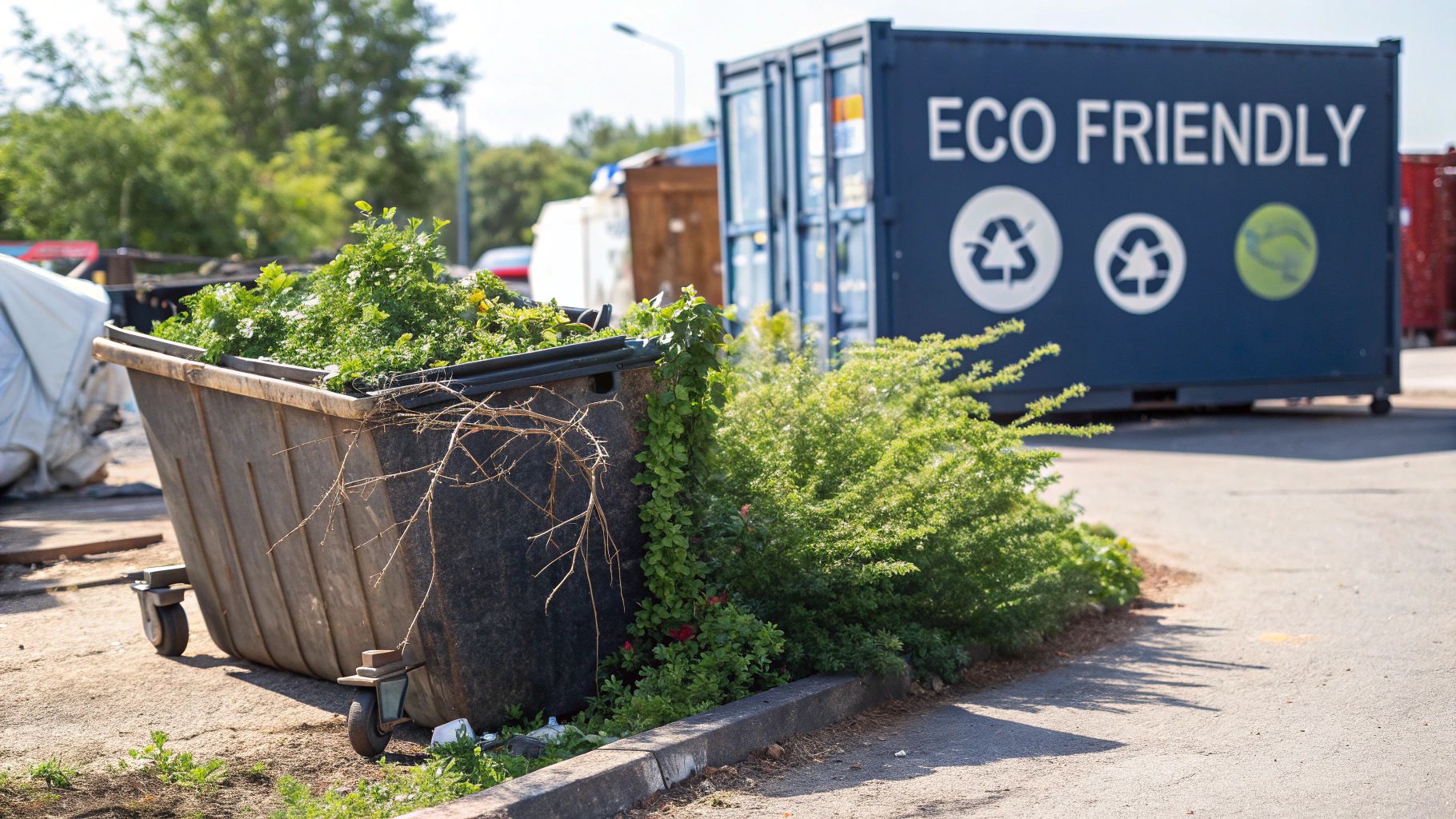 Figuring out how to load your skip isn’t just a real-life game of Tetris. It’s also about safety and sticking to the rules. Knowing exactly what can and can’t be tossed in is key to making sure collection day goes smoothly and your project in Dorchester doesn’t hit any snags.
Figuring out how to load your skip isn’t just a real-life game of Tetris. It’s also about safety and sticking to the rules. Knowing exactly what can and can’t be tossed in is key to making sure collection day goes smoothly and your project in Dorchester doesn’t hit any snags.
For the most part, skips are perfect for general waste from house clear-outs, garden makeovers, and building work. Things like old furniture, wood, plastics, soil, rubble, and bricks are all good to go.
The list of prohibited items is where you really need to pay attention, though. Chucking the wrong thing in can mean the collection is refused, you get hit with extra charges, or you could even land in legal trouble. These aren’t just random rules; they’re in place to protect the environment and keep waste handlers safe.
Items You Can Safely Dispose Of
When you book your skip hire in Dorchester, you can fill it with a whole host of common waste, making them a brilliant solution for almost any job.
- Household Junk: Think old sofas and tables, carpets, unwanted toys, and general clutter from that long-overdue clear-out.
- Garden Waste: Soil, grass cuttings, leaves, branches, and even old paving slabs are all fine.
- Construction Debris: Any wood, bricks, concrete, rubble, metal, and plastics from your building work can go in.
The golden rule is simple: if you’re not sure, just ask. A quick phone call to our team can save you a world of hassle. Tossing in just one banned item can contaminate the whole skip.
And contamination is a massive headache for the waste industry. UK recycling rates for commercial skip waste are sitting at around 47%, and with tighter regulations, operators are cracking down hard. Some waste facilities have seen their load rejection rates soar by 340% since 2022 because of contamination risks. A single battery could lead to fines of over £500, which shows just how costly a simple mistake can be.
Strictly Prohibited Items
For very important safety and environmental reasons, some materials are a definite no-go for a general waste skip. These items need specialist handling and disposal.
- Asbestos: This is extremely hazardous material and must be dealt with by licensed professionals only.
- Plasterboard: It can’t be mixed with other waste because of its chemical makeup.
- Electricals (WEEE): Basically, anything with a plug or a battery, like your old telly, fridge, or microwave.
- Chemicals & Liquids: This includes paint, solvents, oil, and any other hazardous fluids.
- Tyres & Batteries: These need to go through a specific recycling process.
- Gas Cylinders: Pressurised containers are a serious explosion risk and are strictly forbidden.
If you’re doing a home renovation, you’ll likely have old appliances to get rid of. It’s vital to check your guide to recycling old domestic appliances, as most of them can’t just be thrown in a skip. For a full breakdown, have a look at our complete guide on what can go in a skip.
Getting Ready for Your Skip to Arrive
A little prep work before our lorry turns up can make the whole skip hire process a breeze. When you book a skip with us in Dorchester, thinking ahead about the delivery and collection saves a ton of hassle and ensures everything goes off without a hitch.
The single most important thing to check is access. Our delivery lorries are big HGVs, and they need a surprising amount of room to get in and out safely. As a good rule of thumb, you’ll want to make sure there’s a clear route that’s at least 2.75 metres (9 feet) wide.
Sorting Your Property for Delivery
Have a quick walk around and look for any potential obstacles. Are there any low-hanging tree branches, awkward garden walls, or neighbours’ cars that might get in the way? If you know you have a particularly tight or curved driveway, it’s always best to give us a heads-up when you book. We can then plan for it and make sure the drop-off is as smooth as possible.
Once you’ve figured out the access, think about exactly where the skip will sit. Skips get incredibly heavy, especially once they’re full, so they absolutely must be placed on a solid, level surface. Dropping one on grass will just churn up your lawn, and putting it on a slope is a serious safety no-go. A driveway or a paved area is perfect.
Quick Tip: Whatever you do, never ask for a skip to be placed over a manhole cover or drain. The weight can cause serious damage to the services underneath, leaving you with a very costly repair bill.
What to Do on Collection Day
When it’s time for us to collect the skip, there’s one golden rule: don’t overfill it. Every skip must be filled to what we call a ‘level load’. This simply means the waste can’t be piled up higher than the sides of the skip. This isn’t just our rule; it’s a legal requirement for transporting it safely on the road.
An overloaded skip is a genuine hazard. Our drivers are legally not allowed to collect a skip with waste poking out over the top, as bits could fall off and endanger other drivers. If we arrive and the skip is overfilled, we’ll have to ask you to remove the extra waste before we can take it away, which can cause delays for everyone. Stick to a level load, and we can guarantee a quick, easy collection, letting you get on with your day.
Your Skip Hire Questions Answered
Even the most organised projects throw up a few questions, and when it comes to hiring a skip in Dorchester, we’ve pretty much heard them all. Getting a few key details sorted upfront means you can plan with confidence and avoid any last-minute headaches.
Let’s run through some of the most common queries we get. We’ll give you the straightforward, practical answers you need to get your waste management sorted smoothly.
How Long Can I Keep the Skip For?
One of the first things people ask is about the hire period. As a rule of thumb, a standard booking for skip hire in Dorchester gives you the skip for 7 to 14 days. We find this is usually plenty of time for most jobs, whether you’re clearing out the garden or tackling a small renovation.
But we know projects rarely stick to a perfect schedule. Flexibility is key.
If you’re a whirlwind and get the job done faster than you thought, just give us a call. We can arrange an earlier collection, and there’s no extra charge for being efficient!
On the flip side, if things are taking a bit longer, that’s usually fine too. We can often extend the hire period for a small additional weekly fee. It’s always a good idea to chat this through with us when you book, especially if you think your project might overrun. That way, we can build a plan that works for you from the start.
A little tip from our experience: it’s often better to slightly overestimate how long you’ll need the skip. It takes the pressure off and can save you from having to arrange a last-minute extension.
What Actually Happens to My Waste?
Once we collect your full skip, its journey is just beginning. We transport it directly to a fully licensed, professional waste transfer station. This isn’t a landfill; it’s where the important work of sorting and recycling gets underway.
Inside the station, the contents are carefully processed to separate all the different materials. The main goal is to divert as much waste as possible from landfills, helping us all meet the UK’s environmental targets.
- Metals: Big magnets and other clever tech pull out all the ferrous and non-ferrous metals, which are then sent off to be melted down and repurposed.
- Wood: Any timber or wood waste is typically shredded. It can then be used to create biomass fuel or even animal bedding.
- Soil and Rubble: We call this ‘inert’ waste. Things like bricks, concrete, and soil are screened and crushed to be used again as hardcore or aggregate in new construction projects.
When you hire from a reputable company like The Waste Group, you can be confident your waste is being handled responsibly. We take our green obligations very seriously, aiming for the highest possible recycling rates on every single skip we collect.
Do I Need to Be Home for Delivery and Collection?
For the delivery, we really do recommend that you or someone you trust is on-site. It’s the simplest way to guarantee the skip ends up in the perfect spot. You can point our driver to the exact location, making sure it’s easy for you to load up and doesn’t block a neighbour’s drive.
When it’s time for collection, it’s a bit more relaxed. As long as our driver can get clear, unobstructed access to the skip, you don’t necessarily need to be there. The only other condition is that the skip is loaded correctly – nothing piled higher than the sides. If we can get to it safely, we can collect it without you needing to hang around.
Can I Mix Soil and Bricks with General Rubbish?
Yes, you certainly can. It is perfectly fine to put general household or construction waste in the same skip as ‘inert’ materials like soil, bricks, rubble, and concrete. That’s what makes a standard mixed waste skip such a convenient all-in-one solution for most renovation or garden jobs.
However, if your project is going to produce a huge amount of only soil and rubble, it’s worth giving us a shout. We can sometimes provide an inert-only skip. Because these materials are so easy to process and recycle, we can often offer a better price for these dedicated loads. It’s a simple way to save a bit of cash if your waste fits the bill.
Ready to get your project cleared up with a no-fuss waste solution? The Waste Group offers reliable, next-day skip hire across Dorchester and Dorset. Get your instant quote and book online today.
